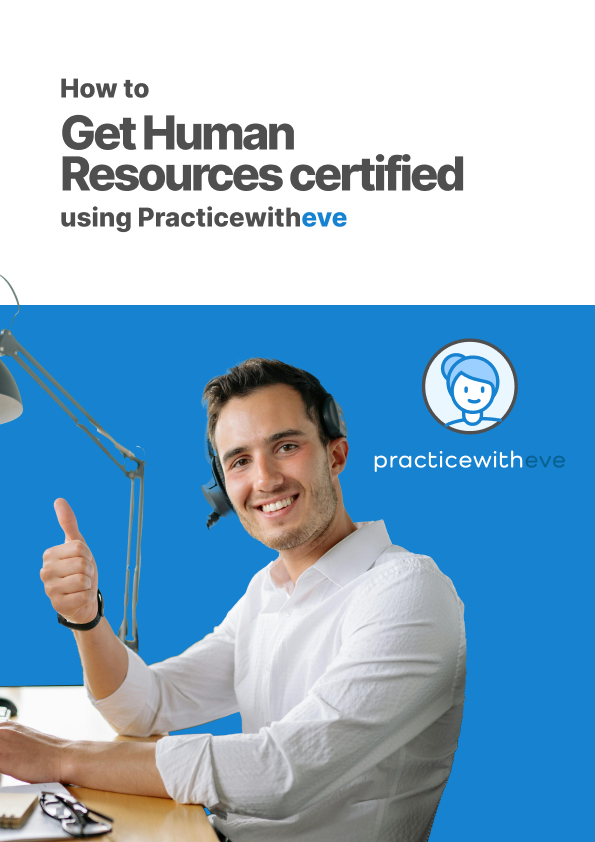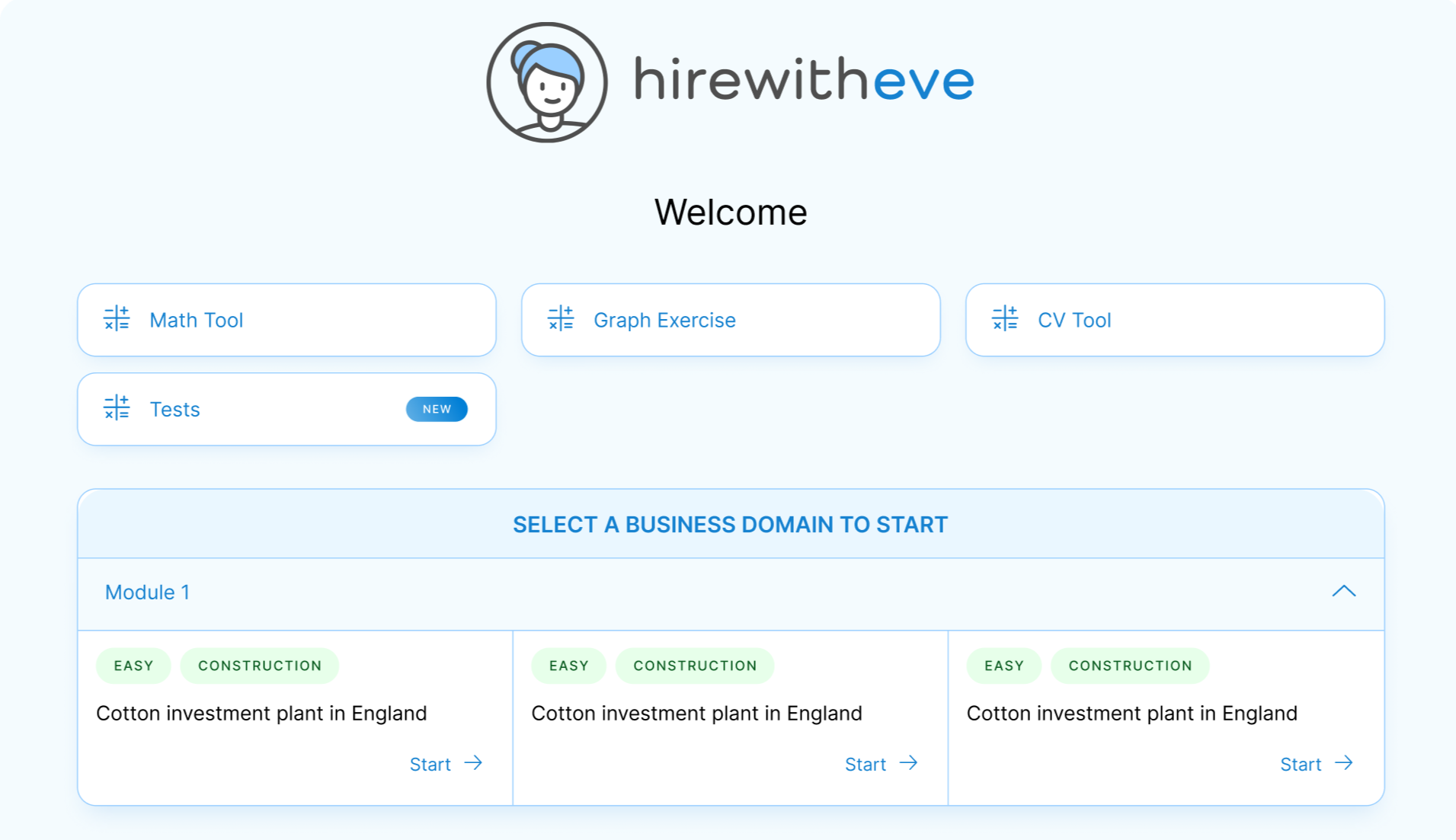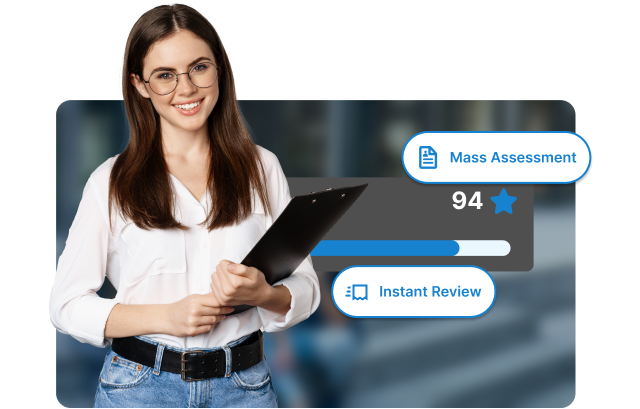Interview Guide for Talent Acquisition

Share
Conducting a job interview is not merely about asking the right questions and grading the responses. It’s an opportunity to showcase your company, its culture, and to prioritize applicants who possess the necessary skills and attributes for the role. To achieve this, you need more than just cookie-cutter questions and resume reviews. It’s essential to incorporate skills testing and active listening into the process.
In this comprehensive guide, we will explore how to effectively prepare for and conduct an interview, what to include in your interviewer preparation, and how to follow up post-interview to ensure the best outcomes. We’ll also discuss how HirewithEve can revolutionize your hiring process, making it more efficient and effective.
Table of contents
Interviewer Preparation: Setting the Stage for Success
Conducting the Interview: A Step-by-Step Guide
Post-Interview: What to Do After the Interview
How HirewithEve Enhances Your Hiring Process
FAQ's
Conclusion
Interviewer Preparation: Setting the Stage for Success
Define the Role Requirements
Before you can start interviewing candidates, you need to have a clear understanding of what the role entails. Define the key responsibilities, skills, and qualifications required. This clarity will help you write a precise job description and guide your interview questions.
Identify Essential Qualities: What qualities are essential for success in this role? These could include both hard skills (e.g., proficiency in specific software) and soft skills (e.g., teamwork, communication).
Analyze Top Performers: Look at your current top performers in similar roles. What skills and qualities do they possess?
Recognize Team Gaps: Identify any skills or competencies that are currently lacking in your team.
Establish Deal Breakers: Determine any non-negotiable requirements for the role.
Create a Clear Job Description
A well-crafted job description is crucial for attracting the right candidates. Avoid jargon and be straightforward about what the job entails and what you expect from candidates.
Be Transparent: Clearly state what you are looking for and what you are not.
Avoid Fluff: Focus on the essential responsibilities and qualifications.
Highlight Benefits: Include what makes your company and the role attractive to potential candidates.
Build a Structured Interview Script
A structured interview script ensures consistency and fairness in your interviews. It helps you stay focused and cover all necessary topics.
Base Set of Questions: Prepare a set of core questions to ask every candidate.
Role-Specific Questions: Tailor additional questions to the specific role.
Icebreakers: Include some light-hearted questions to ease candidates into the conversation.
Interview Scorecards: Use scorecards to assess candidates consistently.
Mix of Question Types: Incorporate different types of questions such as open-ended, hypothetical, and behavioral questions.
Screen Candidates with Talent Assessments
Resumes can be misleading, and traditional screening methods may not reveal the full picture of a candidate’s capabilities. Implementing talent assessments can help you objectively evaluate candidates.
Personality and Culture Fit: Assess whether the candidate’s personality aligns with your company culture.
Cognitive Ability: Evaluate problem-solving skills and cognitive functions.
Language Proficiency: Test language skills if they are essential for the role.
Situational Judgment: Understand how candidates handle specific situations.
Role-Specific Skills: Test for technical or job-specific skills.
Programming and Software Skills: For technical roles, assess coding and software proficiency.
Use Pre-Recorded Interviews
Pre-recorded video interviews can save time and help you narrow down the candidate pool before conducting face-to-face interviews.
Deal-Breaker Questions: Ask key questions that can help you filter out unsuitable candidates early.
Verify Facts: Confirm the accuracy of information provided in resumes.
Save Time: Reduce the number of in-person interviews by eliminating candidates who don’t meet basic criteria.
Understand Your Candidates
Before the interview, gather as much information as possible about your candidates.
Review Skills Test Results: Analyze the results of any talent assessments.
Check References: Contact references provided by the candidates.
LinkedIn Profiles: Review candidate's LinkedIn profiles for additional insights.
Cover Letters and Personal Statements: Look for well-written and thoughtful cover letters.
Additional Materials: Consider any other materials candidates provide, such as portfolios or writing samples.
Conducting the Interview: A Step-by-Step Guide
Introduce Yourself and Your Colleagues
First impressions matter. Begin by introducing yourself and any colleagues who are present.
Build Rapport: Start with light questions to ease into the conversation.
Overview of the Company: Provide a brief description of your organization, its culture, and recent projects.
Explain the Process: Outline the structure of the interview and what candidates can expect.
Structure the Interview
A well-structured interview ensures fairness and helps you gather all necessary information.
Equal Time for All: Allocate the same amount of time for each interview.
Stick to the Plan: Follow your structured script but be flexible if needed.
General Questions First: Begin with general questions to help candidates introduce themselves.
Specific Questions: Move on to more specific questions related to the role.
Listen Actively and Answer Questions
Active listening is crucial. Make sure you give candidates the space to express themselves fully.
80/20 Rule: Aim to spend 80% of the time listening and 20% talking.
Avoid Leading Responses: Don’t guide candidates to the answers you want to hear.
Nonverbal Cues: Pay attention to body language and other nonverbal signals.
Follow-Up Questions: Ask follow-up questions to dig deeper into the candidate's responses.
Maintain Positive Energy and Frame Your Company Positively
Your attitude during the interview can significantly influence a candidate’s perception of your company.
Be Energetic: Approach the interview with enthusiasm.
Avoid Negative Questions: Don’t ask questions that might elicit negative responses.
Highlight Positives: Emphasize the benefits of the role and the company.
Communicate the Next Steps
Always inform candidates about what comes next in the hiring process.
Explain the Timeline: Let candidates know when they can expect to hear back.
Thank the Candidates: Express gratitude for their time and effort.
Take Detailed Notes
Taking notes during the interview is essential for comparing candidates later.
Overall Impressions: Write down your general impressions of each candidate.
Unexplored Areas: Note any topics you didn’t have time to cover.
AI Note-Takers: Consider using HR automation tools to capture details.
Post-Interview: What to Do After the Interview
Review Talent Assessment Results
Talent assessments provide valuable insights that can complement your interview observations.
Objective Evidence: Use assessment results to make informed hiring decisions.
Fill in Gaps: Assessments can reveal strengths and weaknesses that interviews might miss.
Schedule and Conduct Follow-Up Interviews
Follow-up interviews can provide additional insights but should only be used when necessary.
Additional Insights: Gain more information from different interviewers.
Avoid Delays: Don’t prolong the hiring process unnecessarily.
Extend an Offer
When you’ve found the right candidate, make a job offer and ensure a smooth onboarding process.
Smooth Onboarding: Provide a pleasant transition for the new hire.
Negotiation: Be prepared to negotiate terms with the candidate.
How HirewithEve Enhances Your Hiring Process
Why Choose HirewithEve
HirewithEve is a powerful tool that enhances your hiring process by providing comprehensive talent assessments and interview support.
Objective Assessments: Reduce bias and improve hiring accuracy.
Time Efficiency: Streamline the hiring process with pre-recorded interviews and automated assessments.
Comprehensive Insights: Gain deeper insights into candidates’ skills and capabilities.
Features of HirewithEve
Customizable Assessments: Tailor assessments to fit the specific needs of your roles.
One-Way Video Interviews: Save time by screening candidates with pre-recorded video responses.
AI-Powered Note-Taking: Capture detailed notes during interviews automatically.
Detailed Reports: Receive comprehensive reports on candidates’ performance in assessments and interviews.
FAQ's
How Do I Conduct an Interview Step by Step?
Welcome your candidate and thank them for attending.
Introduce yourself and the company.
Explain what the candidate can expect from the interview.
Ask general questions about their motivations.
Talk more about the role and let the candidate ask questions.
Ask more specific questions related to the role while taking notes.
Give the candidate a chance to ask any final questions.
Wrap up the interview and thank the candidate for their time.
What Should I Avoid During Interviewer Preparation?
Don’t go to bed late the day before.
Don’t overstuff your schedule on the day.
Don’t drink or eat anything that might cause odor or get stuck in your teeth.
Don’t wear too much fragrance.
Don’t be rude; always be polite and energetic.
Don’t wear overly casual clothes.
What is the Proper Way to Start an Interview?
Set up your interview space neatly and ergonomically.
Politely welcome the candidate and introduce yourself and your colleagues.
Let your candidates tell a bit about themselves.
Explain what the applicant can expect from the interview.
Start asking general questions and exploring the candidate’s motivations.
Conclusion
Conducting a job interview is a crucial step in the hiring process that goes beyond just assessing qualifications. It is an opportunity to showcase your company, and culture, and identify candidates who align with your organization's values and requirements. Effective interviewer preparation, structured interview scripts, active listening, and post-interview follow-ups are key elements in ensuring a successful hiring process.
Tools like HirewithEve can significantly enhance your hiring process by providing objective talent assessments, interview support, and comprehensive insights into candidates. By utilizing these resources and following the steps outlined in this guide, you can streamline your hiring process, reduce bias, and make well-informed hiring decisions.
Remember, a well-conducted interview not only helps you select the best candidate for the role but also leaves a positive impression on applicants about your company. With the right preparation and tools at your disposal, you can create a positive and efficient recruitment experience for both your organization and potential employees.
The best advice in pre- employment testing, in your inbox.
No spam. Unsubscribe at any time.
TARGET YOUR TALENT
Unlock tailored solutions for your recruitment and hiring needs with Eve Platform's extensive case study library.
Free Resources
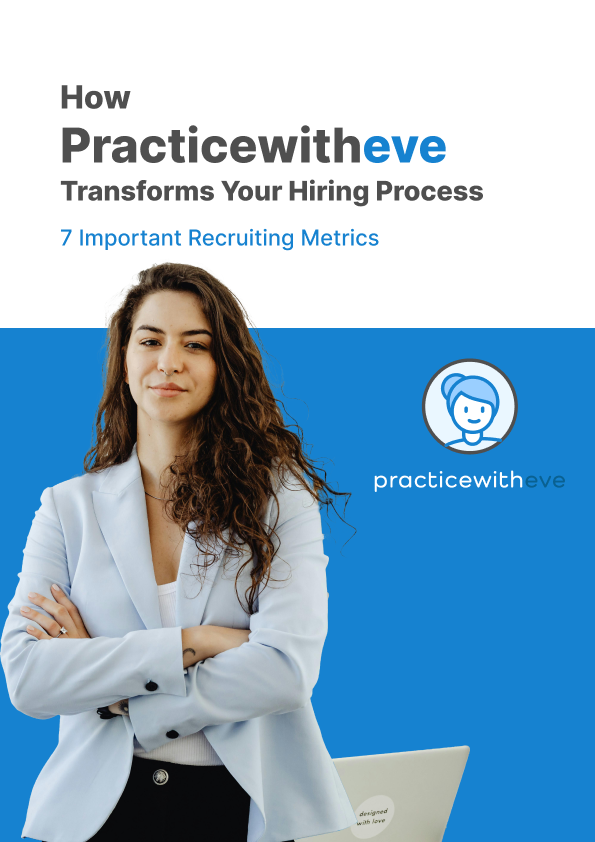
Transforming Hiring: 7 Key Recruiting Metrics
Enhancing recruitment processes with data-driven insights for better hiring outcomes.
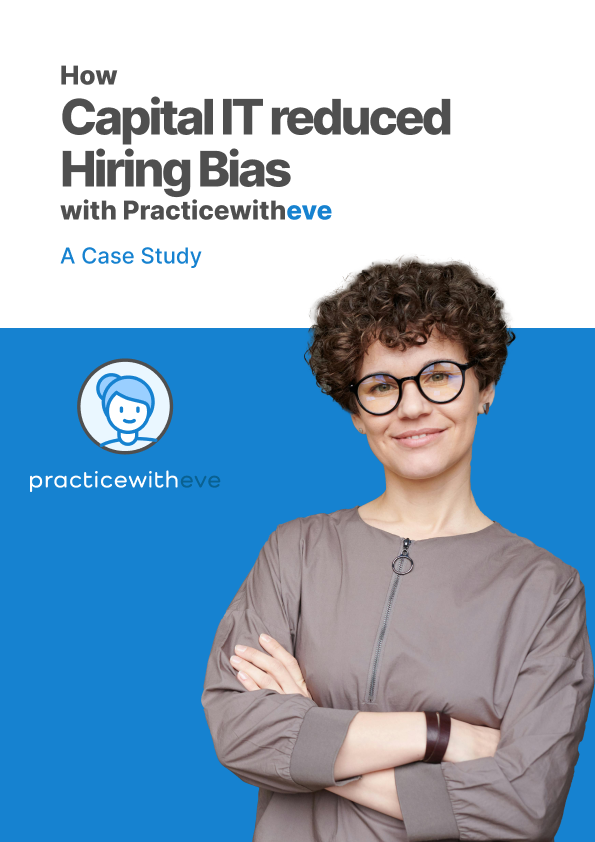
Reducing Hiring Bias with Practicewitheve.
Utilizing Practicewitheve to combat bias and streamline recruitment processes effectively.
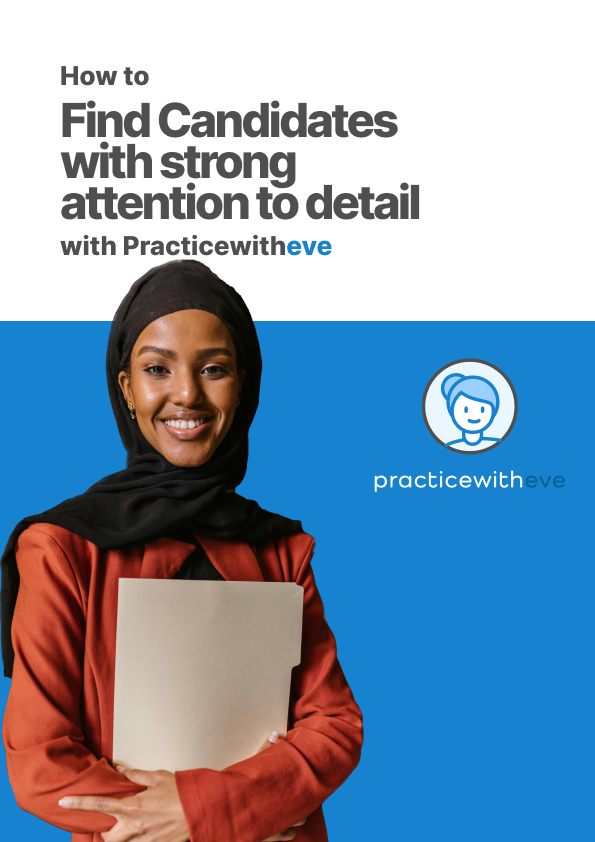
Hiring Detail-Oriented Candidates
PracticewithEve enhances hiring by accurately assessing candidate's attention to detail-oriented.
